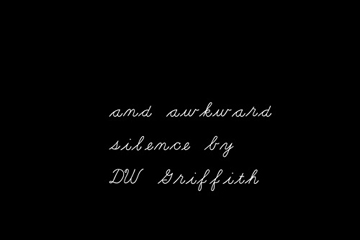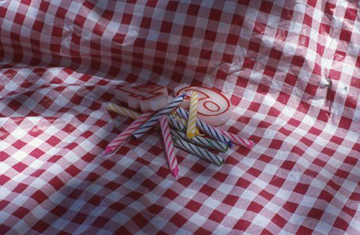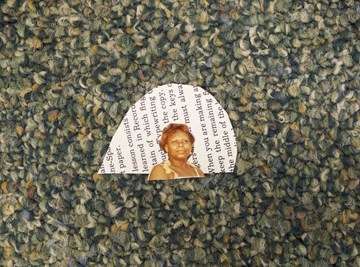
Jibade-Khalil Huffman, still/page from “Way Down East” in “James Brown is Dead and other poems” (Future Plan and Program/Project Row Houses, 2011)
At some time, somewhere I read or heard some one say something equating novels with films and poems with photographs. I think it had something to do with time and space, or girth or something. In any event, many of the artists I know who specialize in photography are deeply immersed in poetry, and many of the poets I know, consistently write about and take photographs. How remarkable.
With this in mind, I visited my friend Jibade-Khalil Huffman at his studio in order to further discuss. One of the busiest dudes around, he is a poet and photographer (in which order I know not) who, in recent years, has been staging performances. Two 35mm slide projectors, one loaded with words, stands next to a carousel meticulously edited with beautifully scene images complimented usually, by live music. Like his work, Khalil is often elusive, piqung interest before quickly ducking back into the shadows, slide projector or subway station.
Khalil Huffman: It’s the most narrative driven poem I’ve ever written, it has a plot. There is this scene that occurs at an emergency room. I was in Florida shooting and the bulk of that trip was spent just walking around at night with my camera. Sort of as this figure – this character the “I” figure of the poem. Shooting with that in mind, but never with specific lines in mind. Except this one evening I thought, “Well clearly tonight I have to go out and shoot outside this emergency room.” And after the fact, before actually shooting – twenty minutes later on the way there, “wait, what am I doing? This is too easy and obvious.
Rebecca Leopold: Too easy for you or too easy for the viewer?
KH: I think both.

Jibade-Khalil Huffman, from "Sestina For Bernadette Mayer," slide projection, dimensions variable, 2010
Flat. Too dimensional: the combination of text and image. Our visual experiences are shuffled in the psyche like a deck of cards, often reappearing in dreams. All the rectangles it takes to fill a day. The flicker of prime time, each and every page skimmed, email replied, traffic sign obeyed, blog rolled. I do not know many languages. I like to think I speak English well, but beyond that my only fluency is in the construction of photographs. Like the lingual, the visual has a grammar and logic.
If you right now become aware of the space between yourself and this page, there is a transmutation of your attention and perception. This sort of perceptual change – this modification of the mental image – would, for a photographer, lead to a realignment of his or her formal decisions in making a photograph…
…Earlier I suggested that you become aware of the space between you and the page in this book. That caused an alteration of your mental model. You can add to this awareness by being mindful, right now, of yourself sitting in your chair, its back pressing against your spine. To this you can add an awareness of the sounds in your room. And all the while, as your awareness is shifting and your mental model is metamorphosing, you are reading this book, seeing these words – these words, which are only ink on paper, the ink depicting a series of funny little symbols whose meaning is conveyed on the mental level. And all the while, as your framework of understanding shifts, you continue to read and to contemplate the nature of photographs. (Stephen Shore, The Nature of Photographs, p. 110/117)
Khalil: I made a mistake in introducing it as, “This is a new poem in the form of a slide show.” That is what I said. I wish I had said, “This is a new text in the form of a slide show.” If you get people thinking about a text as poetry there’s this expectation that it’s going to make sense. Or that it’s going to make them feel a certain way about nature, about the human heart. But if you are more interested, as I am, in exploding language, the opacity of the surface of language. Sort of what language does in that specific context when it’s juxtaposed with image.
[youtube:https://www.youtube.com/watch?v=bJsW6ta4X8o]
A note to self, found on the pad of Post-It notes I keep near my bed.
May 4, 2:50 AM
explosions are
entirely fictive
→ we can not comprehend them ←
Re: JKH
how can you explode
that which works so
to be finite.
All forces pushing it
to mean something
Recently, I have been forgetting to look at real things. There are many scenes to look away from and many screens to look into in the Big City. I found these fragments on Khalil’s studio floor, fourteen floors above the street. I found the carpet that is the floor itself.

The precision of poetry leaves not a line, not even a word uninterrogated. Unlike reality, there is nothing random about the poem. Photographs too, are distinct from life, for everything inside the frame, is absolutely everything there is, if for a moment. Words and images, unlike paint strokes and pen marks, are of the world. Truly a privilege, the opportunity to piece new universes together from the scraps of our own.
Robert D: Responsibility is to keep / the ability to respond.




Pingback: putting what we know into words | POSTstudio